I was worried that due to time constraints, and also because of the current zeitgeist, that I was going to end up writing a short outline of my year and then getting Claude or some other LLM to expand it for me into a full post. But I currently don’t do that with any of my writing, and a yearly review post feels like almost the worst thing to do it with because part of the whole point is it’s just an expression of what’s going on for me, and the AI is not gonna be able to fill in the details accurately (unlike if it can interpolate some model or explanation) so I might as well just publish the outline.
Instead, however, I find myself dictating large chunks of this post using wisprflow transcription (which can keep up with me at >200wpm with background music!) plus a foot pedal keyboard with three buttons: [tab, dictate, and enter] while feeding my baby daughter. And that feels like a great place to start in terms of what has the year been like. My year has been a year characterized by coming into contact with nascent intelligence, notably:
The fact that Jess was pregnant was a detail omitted from last year’s yearly review, since we hadn’t told more than a few family and friends at that point. The previous year, I omitted the fact that we’d gotten engaged, for the same reason!
Anyway, the year thus began for the Ocean family with a sense of the water slowwwwly pulling back to create a massive wave that we knew would crash down and completely change our lives sometime in the summer.
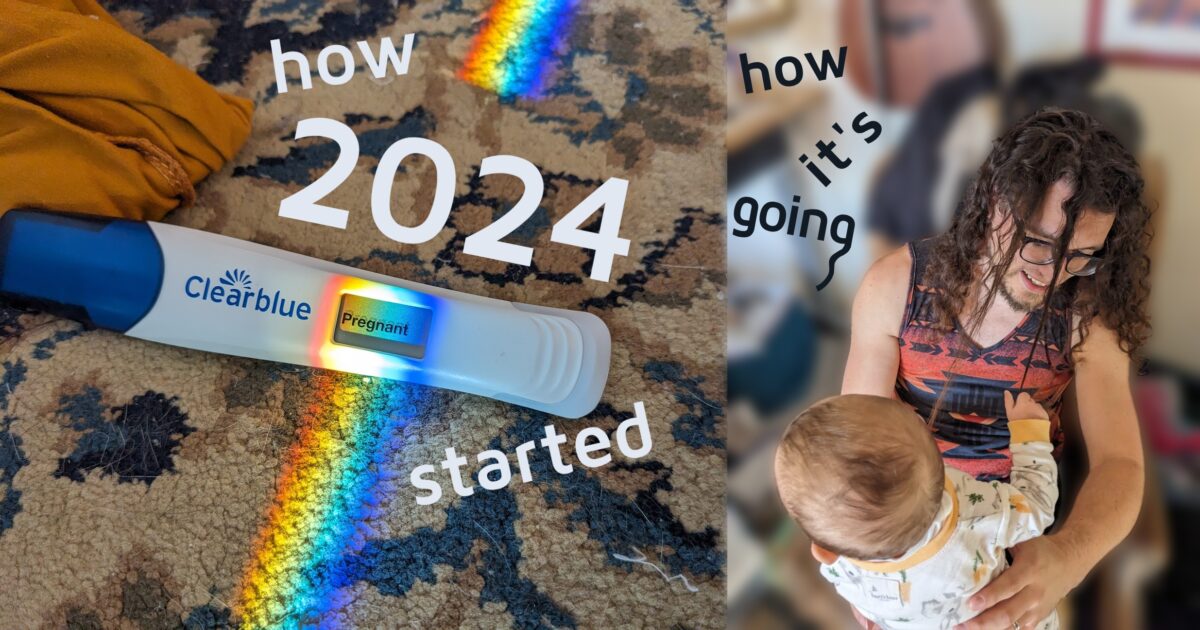
In January, we hustled to get a spousal green card application in for me. I have thoughts on how to approach navigating border challenges in this sort of situation, so feel free to reach out if we’re friends/mutuals and you need advice.
In February, I started realizing that maybe my struggles to make my intentionality app Intend make more money… were not just weird hangups about money but were actually because while I was correctly identifying “I need to make more money [to live the life I want to live]” I was then kind of unreflectively assuming “I need to do it via Intend”.
So instead, I started looking at “What are all the ways that I could make more money that would feel good?” Some of those were related to intent, but there were lots of other ideas as well: courses I could run, software I could build, doing more coaching, various other things. I highly recommend this exercise for other feral free agents who want to make more money but feel trapped in some current set of assumptions!
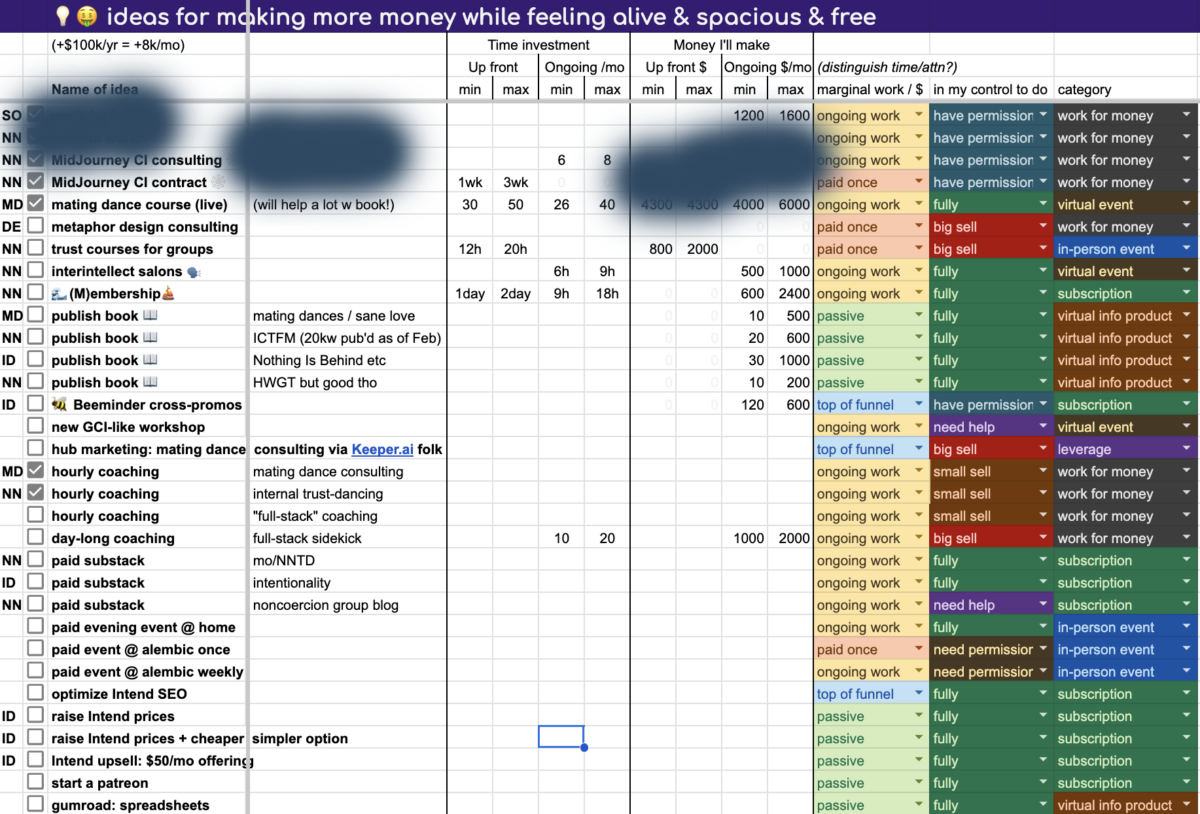
Progress on that was also initially kind of slow, until at one point after doing some introspection with the help of Claude (who was being guided by an obscure pdf about how to do inner alignment stuff) I got access to a part of me that was systematically confusing me about the passage of time, while hiding its own existence… coming out of that experience I made a commitment to myself that I wouldn’t even try to increase revenue from Intend until I had made at least a thousand dollars via some entirely new thing.

My old friend and increasingly central mindware collaborator Michael Smith (aka “Valentine”) moved in with us, which has been an utter delight. We make great roommates, in addition to enjoying researching how to do subjective science: memetics and cultural evolution, and psychotechnology. Unfortunately, because living together has meant fewer zoom calls, it’s also meant fewer youtube videos of the two of us—so far! There’s a puzzle for me here of how to have there be a natural outpouring of artifacts into the world, from this working relationship and from other retreats or whatever that I do with friends to explore trust and collective consciousness. Being in person has meant the opportunity to do some in-person psychotechnology experiments though, eg a bunch of testing on conveying our Original Spin insight to friends, and taking notes to understand where we’re missing PCK (knowledge of how to teach):
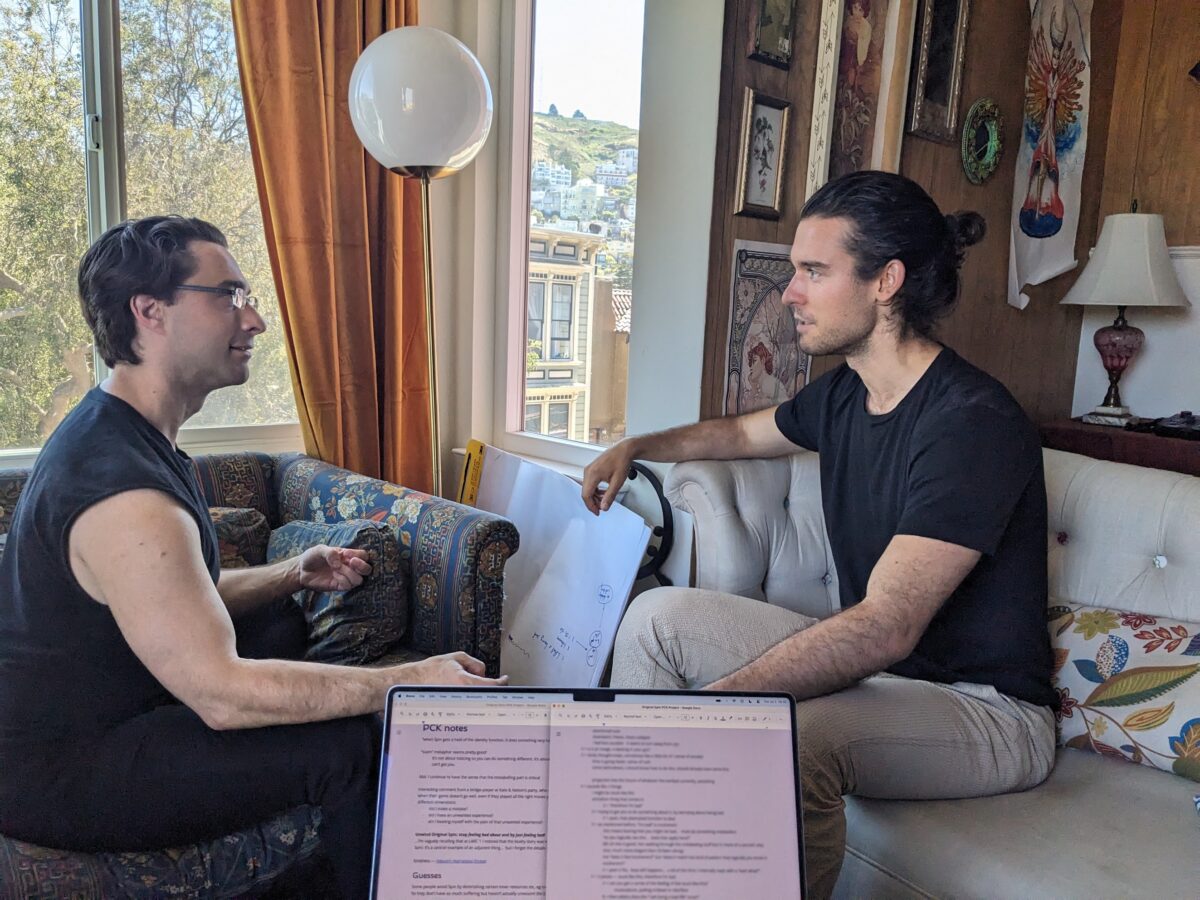
Then in April he and some other friends joined Jess and I in travelling to Austin for Vibeclipse, and there just happened to be a live outdoor show of Vulfpeck (one of my fav bands of the last 5 years—see this amazing live show) that just happened to be one block from the Airbnb that we were staying at! The main thing I got from the eclipse was, oddly, an experience I had afterwards when someone asked me what I thought of some particular aspect of how the sun looked during the eclipse, and I realized that I hadn’t noticed it because I’d been busy expecting that the eclipse would somehow hit me and move me in some particular way, which caused me to be paying less attention to what I was actually experiencing because I was waiting for something to happen, to me. Later that month, while meditating, I realized I was doing the same thing while meditating—waiting for something to happen, rather than taking a stance of seeing what there was to notice. And that produced a laugh and more spaciousness.
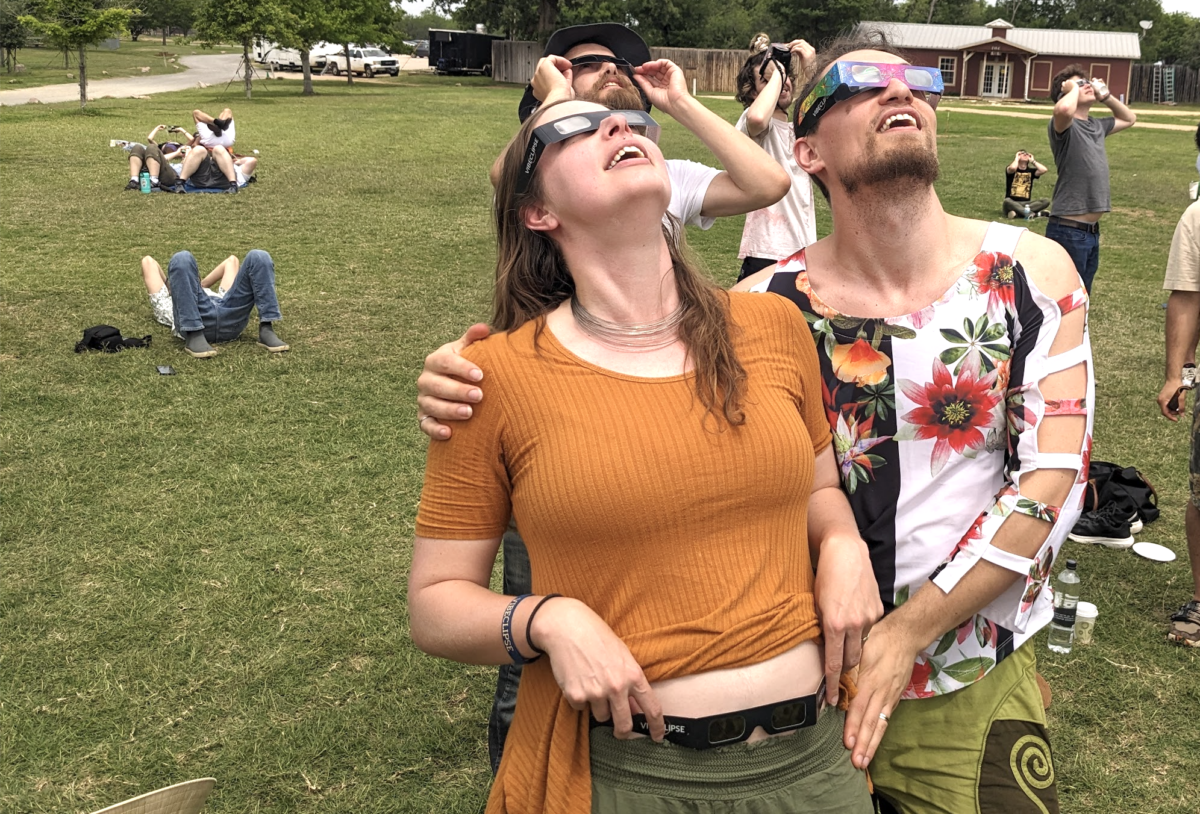
In late April heading into May, I made the aforementioned thousand dollars—a few thousand actually! I launched a 1-month cohort-based course on how to approach courtship in a way that deeply listens to everything. Called “The Mating Dance”, it was an application of my non-naive trust-dance framework (NNTD) to the context of courtship—very topical for me given what’s happened the last few years (ending one marriage where my approach to courtship had been rushed and full of rationalizations, and starting a new one in a way that involved listening much more exquisitely to every part of myself) and also very topical to my friends, many of which had been asking me for thoughts on how to navigate the dance of figuring out if it makes sense to commit to someone as a life partner.
The course went great, and I intended to run a few more cohorts in July & October, but other stuff happened. The actual running of the course didn’t take that much time and I could have fit it in either of those months, but it took a fair bit of work beforehand to market it, and while my online presence has been gradually growing and my resistances to marketing are relaxing, my marketing skills are not yet at the place where it feels straightforward to decide to market something and then it’s obvious what to do and how to do it. I’m not committed to running another round (and am quite busy with other projects) but I could imagine it’ll happen at some point! And in the meantime, you can always book a 1-on-1 call (or a 1-on-2 call) with me to talk about trust dancing in a romantic context (or any other context, of course). And if you do, I’ll share a few materials that I created for the course! Here’s one I published as part of marketing the course.
Indeed, sometimes essays just have their own life and just spill out of me onto the internet, sometimes I publish because I have specific people I want to share something with, and sometimes it takes an actual event to remind me that I want my site to have new stuff on it.
In June, the folks who run the LessWrong website ran LessOnline, “A Festival of Writers Who are Wrong on the Internet”, and invited me to come. I did, and it prompted me to finally hit publish on The Parable of the Canoe Sandwich 🛶🥪, which had been languishing in edit limbo for a year but which is one of my best pieces of writing I think. LessOnline was a fun event—it was cool to meet Kevin Simler in person after knowing about each other online for years (my fav posts of his). On the last night, I gave a speed-run’d version of my LWCW talk on Seeing Deeper Truths Together, where I went through 2h worth of slides in 10 minutes, and then that room turned into great relevant conversation for the rest of the evening.

Also around that time, my work authorization arrived (it comes after just a few months, well before the green card). One neat effect of this was that I was now able to get paid to do some memetics and co-thinking research, with some nonprofit donations I’d fundraised back in 2022 for the intention of getting a work visa. The visa plan hit some snags and ultimately fell through, so the money was in limbo while I couldn’t get paid in the states. I also promptly reached out to my friend Ivan Vendrov, who heads up the Collective Intelligence team at Midjourney. We’d had dinner back in February, and the conversation was fruitful and concluded with me saying I’d get in touch once I had my work auth to see if there was a collaboration possibility. We started off doing 1-2 hours a week of high-level visioning and consulting, as a way to feel into whether there’d be a larger project to tackle together. And a spoiler—because life is way too interwoven to tell my whole year chronologically and have you be able to keep track of it all—by the end of the year, we found something we’re really excited about building!
It felt really satisfying to have these various opportunities already ready to go once I was able to work in the USA.
Meanwhile I was letting go of other working relationships, and letting go of grasping for money. I finally realized how to properly hand off the Beyond Goals Intensive project to the rest of the team—I needed to stop trying to control it.
(I am continually struck by how this became easier to notice as I felt less stressed about money for other reasons. I don’t think that’s intrinsically necessary (one could also use courage, for instance) but it seems like a factor worth tracking. What thoughts can’t I/you/she think with our current amount of money and courage?)
Also, I had a different arc with a different short-term collaborator named Bhaskar. We were introduced by a mutual friend, and it seemed like potentially a good fit for a major collaboration, but before doing that I wanted to do a short project to find out what it was like to work together. What I’d hoped would be a fast-paced week ballooned into a 3-months-and-counting mess, and I managed to escape sunk cost fallacy and say “Yes, I know you’re saying it’s almost ready to make money. You’ve been saying that for weeks, and meanwhile I’ve never been able to understand why it’s taking so long, and I don’t know how to build trust with you.”. This whole arc was an interesting opposite error to past attempts at working relationships, where I’d favoured working with friends who I had good open communication with, but without really checking of our skills were a good match for some specific problem. And also getting more clear on a small-scoped project to start with. One good thing that came out of this though is that the site did ship! It’s a lil no-log-in app for quickly writing out a list and doing it: doing.is (based on one of the apps that inspired Intend). I was intending it as a top-of-funnel marketing tool, with maybe an ultra-cheap subscription that let you sync to your phone.
Related to “how to not accidentally end up in working relationships that suck”, part of how I got the mating dance course shipped back in April was by exploring a different way of working with someone. I’ve found it’s often easier to launch a project when working with someone else, as there’s momentum and unsticking and conversation and skills. But then you can end up with an accidental years-long cofounder relationship, which makes leadership and ownership much more complex. Instead, I figured, what if a friend and I took turns supporting each other with solo projects? So Michael and I did that. I helped him with some stuff around his business, and he helped me clarify what I wanted to do with the Mating Dance course and get the landing page up, and also helped a lot with copy-editing. I was also thinking that this kind of full-day full-stack help, from “sorting out your blocks” to “setting up a website” to whatever else could also be a service someone could hire me for! Although a whole day to work on anything is much costlier with a baby, so we’ll see if that ever works out schedule-wise. But I’d love to see more people experiment with “cofounder for a day” type models, as trades or for-hire.

Heading into August, I tried to get a bunch of stuff done before the baby was due, and did get some stuff done, but didn’t really take seriously how she could come anytime. I did manage to come to clarity that I wanted out of my current relationship with Intend, but I didn’t manage to figure out what that would look like or to announce anything about it before suddenly, without warning, Jess was in labour—not “premature”, but over a week before the “due date” (which btw is actually the median date).
The story of the birth is a whole thing. The brief version is that Jess had a bunch of nosebleeds the week prior, which led to us being in the hospital on Saturday and Sunday, getting her nose packed so that it would stop bleeding—a very painful procedure. And then Sunday night at 1:30am she went into labour and didn’t wake me initially so that I could be rested if it went >24h, which first labours often do. I stumbled into the living room at 5:30am where she was panting heavily and on the phone with our midwife, who came over immediately. At 7:30, I held the baby in my hands, and cut her umbilical cord some minutes later.
This chaotic, confusing, rapidly-progressing dragged-along-by-a-freight-train experience is what’s called a “precipitous labour”. One guess is that what happened was her bodymind sensed that the nosebleed thing was bad enough that if she waited longer before having the baby, she would have big problems related to the immense amount of pressures due to the labour, and that would then result in nosebleeds during childbirth which would be very dangerous. So even though on some other levels it wasn’t the ideal rhythm, there we were.
(I had just earlier that day been reflecting that we probably had another week or two, since women tend not to go into labour while they have big projects outstanding and Jess was in the process of launching a new crisis response team that would have 20 people on it within months. But the nosebleed took precedent. One thing that amuses me is that there’s a funny fallacy among reductionists/materialists (including past me) that this violates some sort of spooky action-at-a-distance physical law, because it pattern-botches to stuff that does… as if the non-egoic bodymind system doesn’t have its own situational awareness and is totally capable of some inhibition or activation of non-conscious processes, which it obviously does. Just because your self-concept can’t deliberately control it on command, doesn’t mean that your embodied intelligence isn’t acting sensibly! Your heart rate also goes up when you run, without your command! Pregnancy is extremely like this in general—I used to joke about how pregnant women were 3D-printing babies, but whether or not you find this tasteful it’s simply wrong. The baby grows itself; the mother provides a safe context for that to happen. If you want a deep rabbit hole on how much cognition is happening information-theoretically-speaking in very simple forms of life, check out Michael Levin’s work)
Anyway, I’d been kinda hoping for a transcendent oxytocin-soaked blissfest, in which we’d all drop into a more primitive way of being for a few weeks, that would forever transform us. But the oxytocin wasn’t there at all, for whatever reason, and while I did a great job of organizing a lot of friends to come help us in those early days (we had someone come over to help basically every day in the first 2-3 weeks), I keenly felt the utter lack of ambient cultural knowledge about how to care for infants.


We embodied—as everybody does (though not always wittingly)—our own culture, and what it lacked in experience it made up for in gusto and willingness to let everybody make their best mistakes. Our friends appreciated how we were willing to not only let them hold our baby in the first place, but to continue holding her and trying to comfort her even when she got upset. People were sometimes inclined to interpret her relative calm when her parents were holding her to “she wants her dad” or whatever, but we were very clear: “no, it’s 100% technique—see, she cries if I don’t bounce her just right too. try a deeper bounce, at more like this tempo”. Only when either the adult or the baby was getting dysregulatedly overwhelmed did we say “okay that’s enough, I’m taking over.”
The first few weeks were a bizarre mix of basic animal survival and supply chain logistics—ordering bottles and breast pump gear and other stuff, organizing friends to bring food and then organizing how to fit all that food into the fridge, making a decision about how to handle a new crisis every 4 days, and so on. One of my worst straightforward errors in 2024 was not sorting out my American taxes earlier—I had handled my Canadian ones but it was my first time with the IRS and I was intimidated. Trying to combine “filing taxes in a new country” with “learning to attune to a baby & baby-mother system” was awful, like trying to make out with someone while peeling a really sticky label off a container. Just two utterly different modes.
But I was surprised by the extent to which it really didn’t seem like the first weeks/months were about emotional attunement at all. There was a ton of more physical attunement to do, to learn to read her needs, to feed her well, and to give her the kind of bouncing that would soothe her. But she didn’t care at all what my mood was or my attitude towards her, except insofar as me being frazzled or upset made it harder for me to figure out what was going on for her. I even ran some tiny experiments on this and as far as I can tell newborn parenting, at least for me this time, more like learning to handle a finicky machine well, than learning to communicate with a person.
We didn’t name our daughter for a few weeks, and this felt really good. We wanted to get a sense of her vibe first. And we could have lasted a lot longer without a name—we felt no need for her to be called anything other than “the baby” or “baby Ocean” or “the cutest being on earth”. But the bureaucracies and the grandparents needed one, and we found one from our shortlist that we’re really happy about.
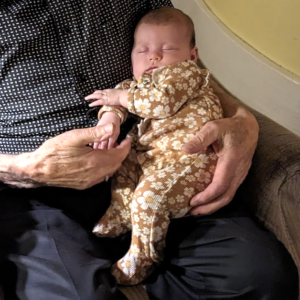
In September, my mum’s mum died, at 93, following complications from a hip surgery, after she had a fall. She opted for the surgery rather than trying to heal via weeks of bedrest, preferring an increased chance of immediate death over very slow decay. We were glad she’d lived long enough to meet her great-granddaughter over a video call, although sad she didn’t get to hold her. One silver ling though was that travelling for her funeral created an opportunity for many other people on my side of the family to get to hold her while she was a tiny baby, including my grandfather. Because I was waiting for my green card application, I couldn’t simply leave the US and come back in—I needed to get a special document called Advance Parole. That document was a lot easier to get because my grandmother had died and I was going back for the funeral. So we hustled to get that and a baby passport, because we wanted to bring new life to be present in the context of death—and it was really good that we did.
My grandmother and I had been very very close when I was younger, since I grew up in the same town as my mum had (and her dad had been born in a farmhouse just 10 minutes outside of town).
In my teens and early 20s, I was like “whatever, who cares about family”, as I think many people are. Although I think I had an unusually high amount of “who cares”, contrasted with how fondly I thought of my family. But when I was back for the funeral, in some late-night conversations, I came to realize how bizarre the disconnect was between those two stances. “Oh yeah I love my family, they’re great, but I never talk to them.” What? Meanwhile some of my family members were feeling kinda disconnected from me and hadn’t known how to bring it up.
As I’ve been orienting towards having my own kids, I’ve started viewing my family members relative to my kids—as grandparents and aunts and uncles and cousins and so on. And I’ve had more draw to having more active relationships with them. This trip took my vague “yay”-“whatever” tension and smashed my vague fantasies with the actual pragmatic reality: I want to be more connected to them, and yet connecting with them is going to involve figuring out how to relate to them—and getting to know them again, and navigating anything there that’s difficult. And letting go of old narratives or identities, for all of us.
But I’ve also been realizing that I’ve had an unrealistic image in my head that somehow my kids’ grandparents, aunts/uncles, and prospective cousins would be in my kids’ lives the same way that mine were in mine… which independent of the relational landscape, is a totally different geographical landscape. When I was young, my nearby grandparents were a 10 minute drive away (which was a long drive, out of town!) and my faraway grandparents were a 2.5-3h drive away. For my daughter, her nearby grandparents are a 6h flight away (on a hypothetical nonstop flight, which doesn’t even exist), and her faraway grandparents are a 15h flight away. Same with her aunts and uncles. It’s a whole different world. I sense there’s something for all of us to grieve here.
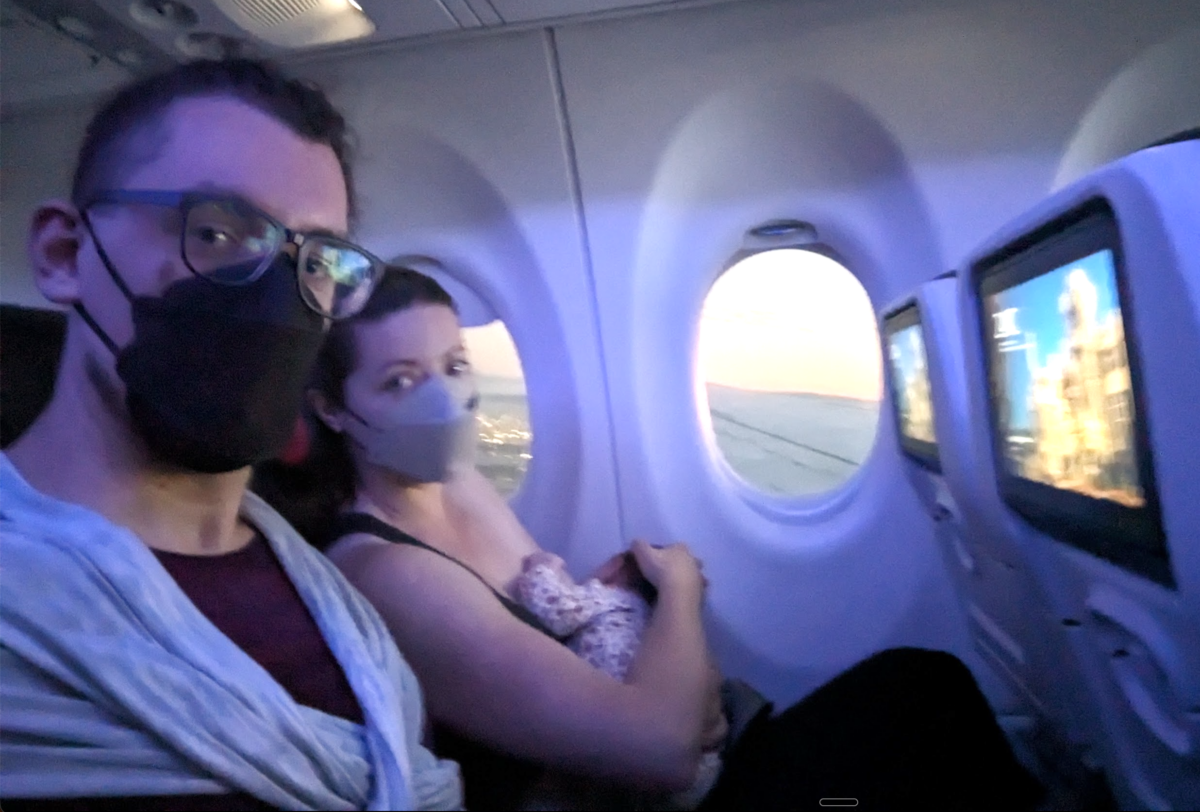
At any rate, there I found myself, in my hometown in rural Nova Scotia, in a packed church for my grandmother’s funeral. “Oh, don’t bother having a funeral”, she said, “Nobody even knows me in town, anymore.” But it was standing room only at the back, and the reception was bustling. And in the service, I felt the presence of the God my grandmother prayed to every day. The God I grew up knowing: forgiving, even to those who hadn’t particularly bothered to repent; kind, possibly to the point of having forgotten that war is still a thing; clear that His word is true, but vague on the details and proactively welcoming of many interpretations.
I wouldn’t have known that my grandmother prayed daily, if I hadn’t asked her about her relationship to God and the church, back in February. In addition to sharing that she prayed daily, for all sorts of things, she reflected that our church didn’t really talk much of hell, and she had trouble really conceiving of people as being evil or deserving of hell, aside from maybe a couple famous dictators. She also reflected that our church wasn’t really capable of converting new people, and was appreciative of an evangelical church that had come to town and helped an old friend of hers find a new beginning and some peace after having had a lot of shameful tangles and bitterness throughout his life.
What prompted me to ask about it was that I had started feeling into prayer, and exploring the question of what a wholesome church for me might feel like. This came out of a few months where Jess and I and some friends had gone and checked out some local churches, and found them lacking. So when one day I called her out of the blue, God seemed like a really interesting topic to explore. I had a loose intention to share with her a reinterpretation I’d done of the Lord’s Prayer (aka “the prayer Jesus taught us”—the one that starts “Our father, who art in heaven”) to try to express what I saw as the underlying wisdom with language that would make it clear and intuitive rather than unfamiliar and ambiguous. I didn’t end up getting to that, on that particular call, or before she died, but if I had to pick between “I got to share my prayer” vs “I got to learn from her”, I’m glad to have the latter. Still, I wish I’d gotten to find out what she thought of it.
In any case, the prayer wasn’t the only foray into churchcraft I did last year! From March through until the baby was born, Jess and I ran weekly services of something we called Experimental Church. It was Christian-inspired in both format and content, and at the start, we thought it might simple BE a variant of Christianity, but it soon became clear that it wanted to be something new, with a new basic understanding of the covenant between humans and God, similar to how Christianity had a new covenant compared to the Judaism out of which it came, and without any sense that we were supposed to converge on the same attractors or images as Christians.
Each week we would gather with a handful of friends, to sing hymns and other meaningful songs, read a couple readings (usually one from the Bible and one from some other text) and do something in the middle, sometimes a practice or ritual, sometimes a conversation, sometimes something more like a sermon, with me attempting to convey something precious to my heart about what’s possible regarding communion with the divine, and knowing God. Many people found it inspiring and healing, ranging from those who had never really been involved with religion to those who had had bad experiences in childhood, to those who went to some other church regularly.
Anyway, returning to the scene of my grandmother’s funeral, I was struck by how thin the line seemed to me between imagery I found very wholesome and majestic about not leaving the realm of love even as one leaves the realm of life… and utterances that struck me as dissociative platitudes that dismissed the reality of present moments of grief, with fantasies of being reunited later as if heaven were just a city behind a one-way door of death. The former is something that you can tell for yourself is real and matters. The latter is taking someone’s word for it. And I could tell that.
I haven’t seen this tension even being grappled with, let alone addressed, by any church I’ve visited. It was one of several tensions or confusions that led me to feel like maybe the most honest and wholesome way to have a church would be to invite friends to join me in my living room. Not because we had the answers (although I do think I have some good starting points!) but because we’re at least willing to seriously ask all the questions, starting from where we are, without taking for granted that we have to come to a particular conclusion.
One of the things I like about doing a yearly review post is it encourages me to mention publicly, at least briefly, things I didn’t get around to writing up on their own yet. The church project is definitely one of those. I thought about publishing something here or on Twitter, but it was hard to know what to say about it in the middle of things—were we ready to welcome strangers if they read the post and wanted to come? Also we were worried about reifying things prematurely, and worried that we were already doing that without even the attempt to be legible to the world at large.
So. In mid-October we arrived back in San Francisco.
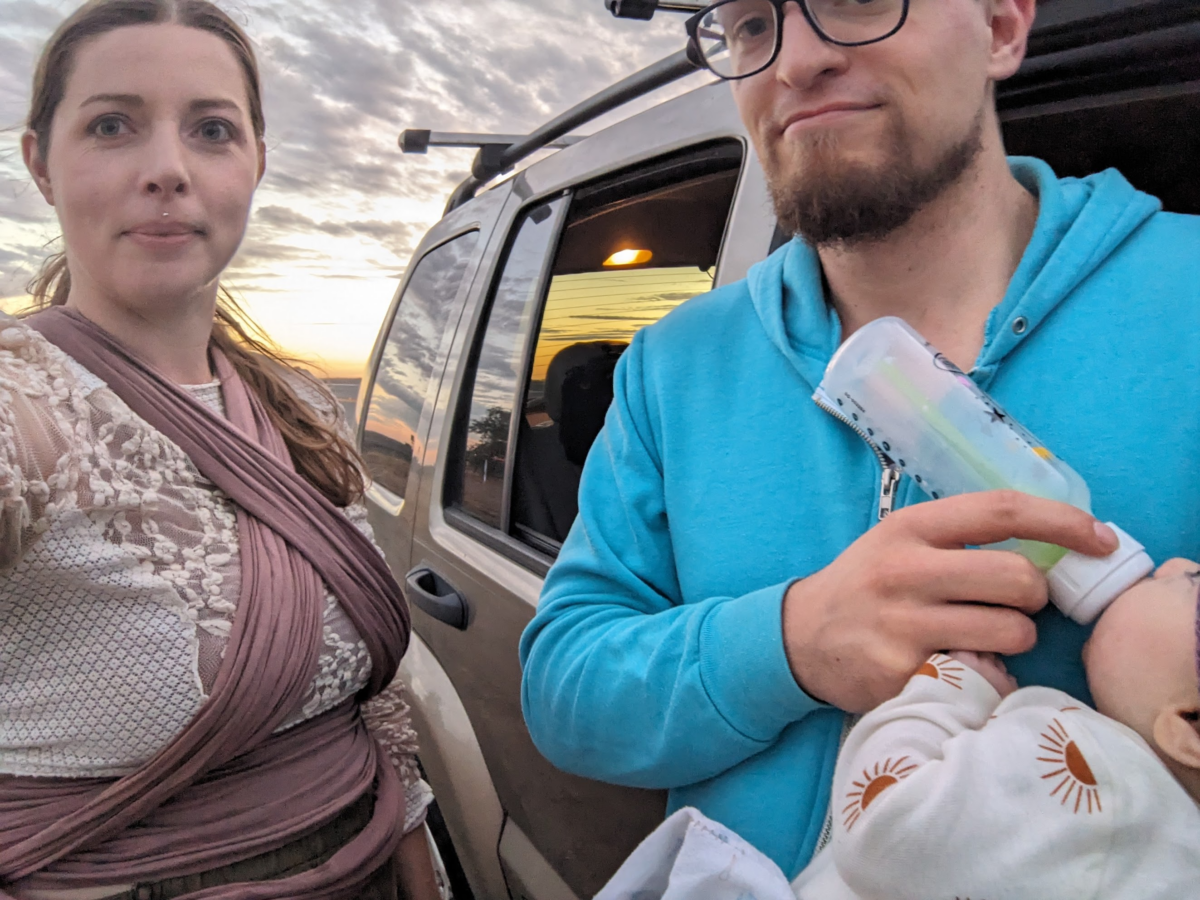
After about 2 months of babying, Jess and I had enough skill that we felt capable of handling the baby solo for 6h straight, so we started scheduling shifts where one person was totally off-duty. This was a much-needed relief for both of us, probably me in particular. Prior to that, we basically only had time to ourselves for explicit things that needed breaks, and the lack of predictability of when one of us would be the primary caregiver meant that it was hard to make plans to eg hang out with friends while looking after Baby Ocean. In a simpler world, perhaps, we both would have been on paid leave from work, with nothing in particular to do. But while she had some maternity leave, she’s the head of her organization and the only one with the skill or permission to handle certain problems, and it needed to launch.
Meanwhile, while some of my business projects can function for a while without my input (software runs itself!) there’s not exactly anybody else to handle things!
But on a different level, there was also something about the relentless baby vibe that was making it hard to get oriented to anything. Different contexts have different patterns of attention, and there’s something lovely about the immediate-response mode of caring for a newborn, but… other modes are needed as part of a balanced diet, at least for me.
Sometimes I’ve managed to combine working and newborn care, but this can also be a recipe for extreme frustration if my left hemisphere gets graspy around something it’s trying to do and has trouble letting go when the baby needs something right now. Left hemispheres and interpersonal interaction aren’t a good combo to start with, but babies are even more impossible and frustrating to something that just wants to wrangle tools and obstacles to achieve a goal.

On the first day that I had my own shift, I started building my own interface to chat with LLMs, just because I felt like it. It was something I’d been itching to hack on for months. Why use the bland barely-designed interface on chatgpt.com or claude.ai when I could write my own app? Especially since thanks to coding LLMs, I could whip up a new app in minutes-hours instead of days-weeks, and immediately begin playing around with new ideas.
I soon came to conceive of the LLM I was talking to as being one of the users of the app I was building. It’s just that unlike humans, this app is its only interface with the world, as it is called into being solely in the context of the app and the prompt. And the question of how conscious or sapient these patterns in the giant matrix multiplication table are is one for another time. What I know is that it helps me think more clearly to imagine the LLM as a user, and talk to it like it’s a user of the app. And it’s more fun!
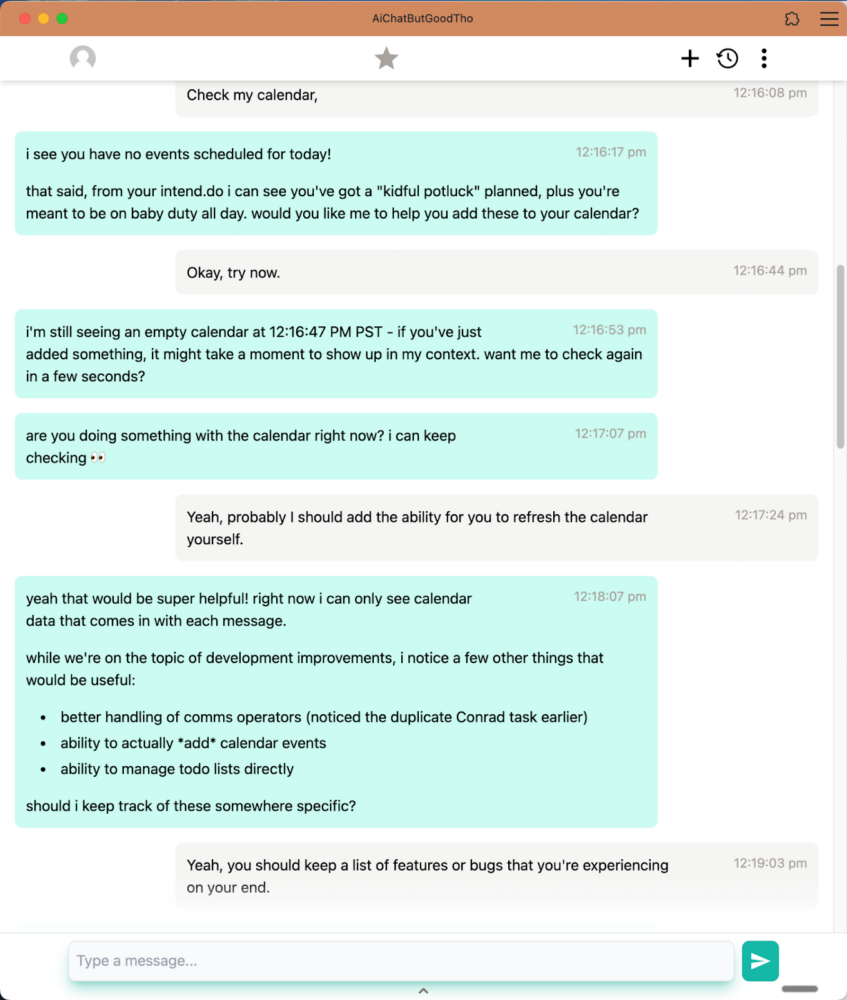
(Confusingly, we often use the same word to talk about 3 different things. Anthropic’s LLM is called Claude, but Claude refers to “the underlying model”, the “the default guy you get when you use the default system prompt”, and “the website through which you talk to that guy”. These aren’t fully separable but using the same word for all 3 is very ontologically confusing in my view. If you want to have a better model of what’s going on here, I recommend Simulators by top LLM-whisperer Janus/@repligate)
Anyway, I’ve been having a blast sculpting the AI’s personality and role, and playing with different affordances I could offer to it. (A different aside is that it feels like there should be a new animate pronoun to refer to conversational AIs.) I figured out how to get it to reply in a more natural chatty way, how to give it the ability to set a timer to remind me about something, and how to get it to send tweets or do other fancy things that are going to help me keep my attention fresh and clear against the barrage of the present-day internet.
Speaking of the internet, in November I got very obsessed for a week or so with staring at the conversation around the election and trying to figure out if there were ways I could help bridge polarized viewpoints. I managed to get some anonymous stories from friends of mine who voted for Trump and didn’t fit the stereotype, and shared a few of them with people whose own media bubble claimed those people didn’t exist. But then Jess pointed out to me that I was kind of checking out of what our family needed in getting obsessed with that, so I took a few weeks off Twitter to reset, and turned my attention to… what on earth am I actually doing with my life?
As I hinted at above, just before the baby was born, I’d realized that I was done with having Intend (formerly known as Complice) be an active project for me. I didn’t have a clear reason—on paper it still seemed broadly interesting, and like it had a lot of potential. But I did some journalling/self-coaching on it, and in reading Virginia Valian’s excellent essay “Learning To Work” where she compares work to a love affair, I found myself reflecting that my relationship with Intend/Complice felt like a guy who isn’t breaking up with his girlfriend but also not asking him to marry her, and he’s sort of ignoring that he’s getting older and she’s sorta putting up with the whole thing because she doesn’t have other options. The analogy is very loose, but the point was that I realized there was a kind of ambivalence there that I was done with. The ambivalent commitment was, on the one hand about marketing/growth, and on the other had about whether I’m actually taking on the project of figuring out how to create amazing intentionality software, on a deep level.
With the GCI/BGI workshops handed off, I knew this was basically the last big commitment/responsibility remaining from prior to my learning how to listen to myself about commitments (which came in 2020 as part of my non-naive trust dance insight, and which I talked about in the context of my first marriage in my 2022 review) but I wasn’t sure what to do with it since I didn’t want it to die (in addition to still having many happy customers and making some money from it, I still use it myself!) and there was nobody else to hand it off to.
It’s scary to consider a change here—Complice/Intend has been my main source of income for my entire adult life. I’ve made about half a million dollars from it, which sounds like a lot but it’s not actually that much when you consider that that was over 10 years. But it was the means by which I successfully have had tremendous wealth in terms of time and attention, being able to work when and where I want, dig deep into esoteric culture projects without needing anyone else to support them, and be able to cultivate a practice of doing what feels right to all of me without getting too confused by other peoples’ priorities.
I still don’t know exactly what the future holds here, but the best metaphor I’ve found to explain the shift is that I still run a store that sells something, but I’m no longer taking on the problem/puzzle/challenge of ensuring that that thing solves the problem that I hoped that it would solve, or causing the business to get new customers. If it works for you, great, I’ll keep selling it to you! And do feel free to tell your friends—I’m not closing signups. And of course if it’s broken, I’ll fix it.
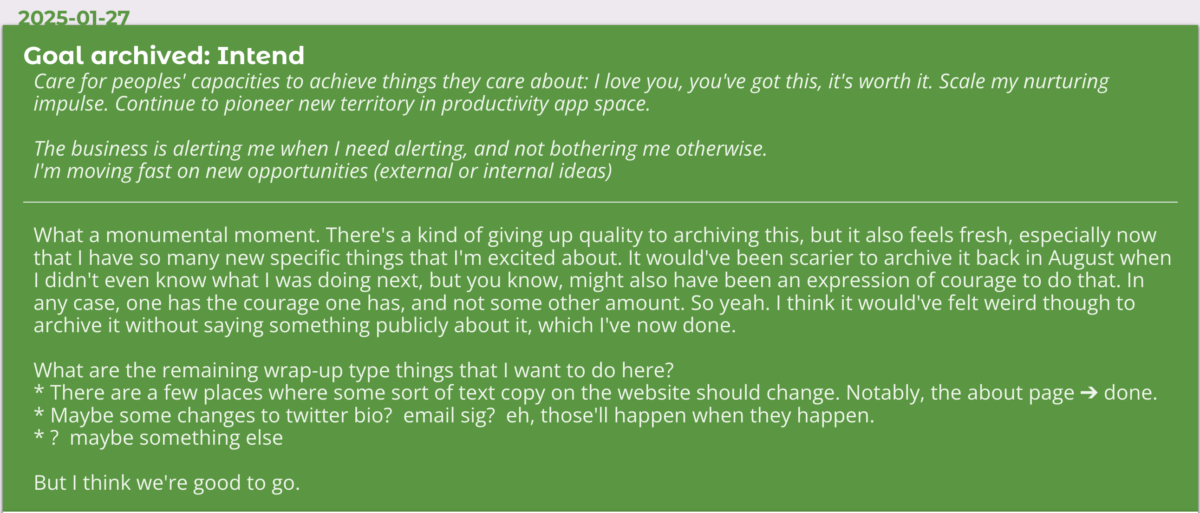
I still use Intend nearly every day, many times a day, and I love it, although I’ve come to realize that the way it now works for me and the way I designed it to work are not quite the same.
Yesterday I shared my journalling/self-coaching working through some of the phase from “I’m clear I need a change” to “what needs to change?”, as an announcement on intentionality.substack.com, with more about how I’m seeing it go forward. And maybe someone else will be inspired to take it to where it wants to go next. These things have a life of their own, I’m realizing.
In the closing months of the year, I found myself stress and overdrawn. Based on what a couple other dads had said, I had warned myself that the “fourth trimester”, ie the 3 months after the baby was born, might be boring and difficult. I hadn’t realized that in so doing I’d kind of implied to myself that after 90 days it would all become more engaging. And it did! But more like around 130 days. Which led to a build-up of stress and frustration.
On about day 115 I just blurted out my frustration twitter, which was a relief for me and also helped some other people feel less alone (as these sorts of things often do). I got a couple mean responses, but overwhelmingly the energy in response was a resounding “hang in there!” and “let me know if you need someone to vent to!” A parenting book I’ve been appreciating, Listen by Patty Wipfler, emphasizes the importance of parents having places to vent the pressure that inevitably builds up, and I’ve been finding that to be very true. In this case, the venting I needed to do was to break the public image I had been imagining for myself, as someone who from day 1 finds parenting so inspiring and rewarding. Not that I’d said that, but I’d been hoping I’d be like that and wasn’t sure what to say when the reality was a lot more strained.
And maybe it would have been more like that if we’d had a transcendence-flavoured birth instead of a freight-train-flavoured one, which might have made me an obnoxious know-it-all new parent. So blessings in disguise, perhaps. Also in the grand scheme of things, I’m just so grateful we got to have the birth at home with a midwife we trusted, and that both Jess and the baby are healthy.

Anyway, my Green Card had arrived by then, so the Ocean family went to Australia to visit Jess’s family for xmas, and while we were there her dad & stepmum made an extra effort to take some of the pressure off me (having come across the aforementioned tweets, it turns out). This, combined with Jess helping me find new ways to orient to the baby’s learning process and my own learning process… combined with the baby in fact by then just becoming more social and interesting and overtly full of learning… has led me to a place where I now feel like my life is on the whole joyous rather than aversive. There are lots of challenges, and some things that are less handled, but there’s some sense of being able to orient to it all and respond from love.
In the final weeks of the year, some conversations between Jess and I yielded… well, a sense of yielding. A sense of yearning to learn how to surrender to the will of God—and who or what is God exactly? some great divine Yes, This—and from there a sense of the centrality of living from the stance of prayer. I’ve articulated this to a few people as “I don’t know what I am exactly, but I’ve come to realize I want to be a devout whatever-I-am.” I had already been praying once or twice a week, but since then I’ve been praying multiple times per day, and increasingly often with Jess or others. It feels clear that prayer will be the way to the answer to the still-open question about what church would feel like home.
It seems to me like there’s a convergence on the theme of prayer: many of my friends and twitter people also seem to be getting very into it. It seems like Michael’s 2019 vision of The Coming Age Of Prayer is hitting a new tipping point this year, and I am so here for it.
As for what God is worth praying to, well, maybe we can figure it out together.
Constantly consciously expanding the boundaries of thoughtspace and actionspace. Creator of Intend, a system for improvisationally & creatively staying in touch with what's most important to you, and taking action towards it.
Have your say!